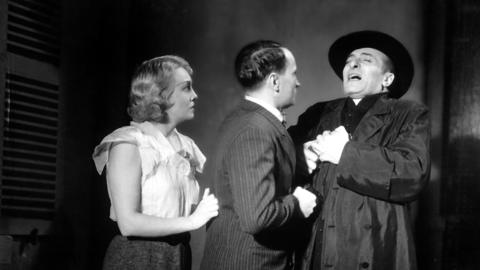
Mark Cosgrove Cinema Curator
on Wed 18 July 2018Bazin 100: Celebrating a cinephile activist
Posted on Wed 18 July 2018
Ahead of our Bazin 100 celebration screenings and discussions at Cinema Rediscovered, Cinema Curator Mark Cosgrove reflects on the passion and curiosity of prototype cinephile activist, André Bazin.
“The critic’s function is to prolong the maximum shock of the work of art on the intelligence and sensibility of their readers.”
- André Bazin (1918 - 1958)
Influential French film critic André Bazin is perhaps best known through the filmmakers he inspired and the film movement they created; directors such as Francois Truffaut, Jean-Luc Godard and Jacques Rivette, who were previously film critics under Bazin’s influence, turning their criticism into action to become filmmakers. Their films, including; A Bout de Souffle (Breathless, 1960) and Le Quatre Cents Coups (The 400 Blows, 1959, which Truffaut dedicated to Bazin) were to become identified as La Nouvelle Vague (The New Wave) which would invigorate and reshape the language of film. At the heart of the Nouvelle Vague was a critical attitude and love of cinema that refreshingly questioned the assumptions of filmmaking orthodoxy whilst relishing the joys of the cinematic. That critical attitude and love of cinema was Bazin’s gift to his young acolytes.
He was introduced to English speaking readers in the late '60s through two collections of writing with the simple yet searching title, What is Cinema? Vols 1 (pink) and Vol 2 (green), which were translated by American academic Hugh Gray. These contained essays like The Evolution of Film Language and The Virtues and Limitations of Montage that would, unfortunately, define Bazin in the wider critical world (narrowly in my mind) as questing for the ‘real’ in both form and content, of which Italian Neorealism and techniques like long takes and depth of field as seen in the films of Orson Welles and William Wyler were exemplars. Or, as co-founder in the mid 1950s of Cahiers du Cinema and, therefore, the father of "The Auteur Theory". It seems appropriate, then, that 100 years after his birth the range and scope of Bazin’s writing about film (and indeed television) is being made more available. Academic Dudley Andrew is to be thanked here for bringing into circulation more of the circa 2500 pieces written by Bazin that cover subjects ranging from 3D and Cinemascope to arts on television and TV serials.
André Bazin’s life was short but impactful; he was born in April 1918 as the First World War was coming to an end, came of age on the lead up to the Second World War and died aged forty in November 1958. The wars changed everything for everyone and, for Bazin, this involved both a political awakening and reinforced, for him, the value of culture and, in particular, the new popular medium of film. This new form was just a few years older than Bazin himself and had gone from niche technological innovation to the most popular cultural form (certainly in the western world) in less than three decades. Bazin’s critical writing would try to describe how this young medium on its own terms worked. Where other writers on film would invoke other art forms to compare with, Bazin wanted to understand what was unique about the language of film. Also, importantly, he recognised the social, cultural and political context in which film and film language was to be considered. This is none more evident than in his appreciation of the films of Jean Renoir and in Le Crime de Monsieur Lange (1936) in particular.
Le Crime de Monsieur Lange was bathed in the politics of the French Popular Front of the 1930s, an alliance of left politics with shared values of community, work and society. The setting of Renoir’s film in a shared courtyard where the printing press sits alongside domestic life can be seen as a microcosm of the left commune ideal into which the capitalist boss, Batala, re-enters in order to break up the communal utopia and through which the crime of the titular Monsieur Lange is to be viewed. There is a famous counter-intuitive camera move where Renoir’s camera follows the movement of Lange down to the courtyard but, against expectation, takes the opposite direction of the character’s movement to sweep round the courtyard and pick up the action after a full 360 degree turn. Critics at the time criticised the awkwardness of Renoir’s technique. Bazin describes it thus,
“This stunning turn of the camera, apparently contrary to all logic, has perhaps, psychologically or dramatic justification (it gives an impression of dizziness, of madness, of suspense), but its real raison d’être is more germane to the conception of the film: it is the pure spatial expression of the entire mise en scène.”
Bazin thus locates the shot as a central part of the film’s ideological thrust. Renoir was not making a film about the action, he was making a film about an idea. Bazin had watched Le Crime de Monsieur Lange many times and was working on a book on the film’s director at the time of his death. He had re-watched the film on television the day before he died and was making more notes on both the film and Renoir, which Truffaut posthumously collated into a book.
We will discuss the film and more at the screening and panel during Cinema Rediscovered, but I want to emphasise that this celebration of Bazin’s centenary is not about celebrating some old guy who wrote last century, but to mark someone who, in his twenties and thirties, tried to define and describe film culture: how it worked and how it represented. Through Bazin’s work for Travail et Culture (Work and Culture) he organised screenings at factories, town halls and schools across France. He was and still is the inspirational prototype cinephile activist. I wanted to draw attention to these qualities and also to imagine what Bazin would make of contemporary film culture. I suspect he would have wanted to understand the possibilities of VR in relation to the cinematic, would have been wondering what the dominance of Netflix and Amazon mean for world film and would have been writing in praise of directors like Lynne Ramsay whose You Were Never Really Here has echoes of Renoir’s Le Crime de Monsieur Lange in that it is less about action and narrative than it is about character and place.
Footnote: Bazin and the Auteur theory
Yes, he admired particular directors, none more so than Renoir, but also filmmakers like Roberto Rossellini, Luis Buñuel and Orson Welles, but he was not much of an enthusiast for the auteur theory. This was the cause célèbre of his youngest protege Francois Truffaut, who famously gave birth to the theory in the pages of Cahier du Cinema as part of an ongoing assault on the “Cinema du Papa”. Truffaut, along with the likes of Godard, kicked against the establishment and Bazin, both as editor of Cahier du Cinema and as mentor, was not going to stand in their way. He, however, was much more considered about film’s relationship to the wider culture, which quickly becomes evident in the breadth of his writings.
Written by Cinema Curator, Mark Cosgrove.
Le Crime de Monsieur Lange (Sat 28 July, 11:00) and You Were Never Really Here (Sat 28 July, 15:10) screen as part of Cinema Rediscovered.
There will be a panel discussion on Bazin's life and legacy, Bazin 100: Qu'est ce que le cinema? Vol 1 (Sat 28 July, 13:10), hosted by Mark with guests; Tara Judah (Watershed Cinema Producer) , Tega Okiti (Film programmer) and Nick Bradshaw (Online Editor, Sight & Sound).
A follow up discussion and illustrated talk takes place at 20th Century Flicks, Bazin 100: Qu'est ce que le cinema? Vol 2 (Sun 29 July, 13:00).
Full details of our Bazin 100 celebrations at Cinema Rediscovered can be found here.

